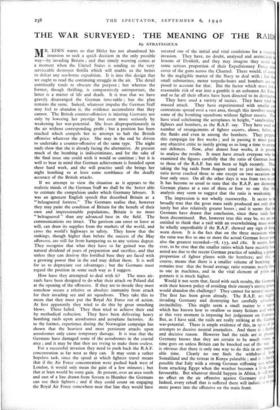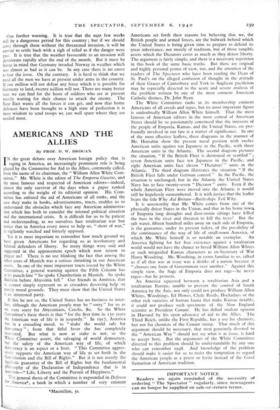THE WAR SURVEYED : THE MEANING OF THE R2-11)
By STRATEGICUS
MR. EDEN warns us that Hitler has not abandoned his intention to seek a quick decision in the only possible way—by invading Britain ; and that timely warning comes at a moment when the United States is sending us the very serviceable destroyer flotilla which will enable us the better to defeat any sea-borne expedition. It is into this design that . we ought to read the continuing struggle in the air. The detail continually tends to obscure the purpose ; but whereas the former, though thrilling, is comparatively unimportant, the latter is a matter of life and death. It is true that we have gravely disarranged the German time-table ; but the plan remains the same. Indeed, whatever impulse the German Staff may feel to abandon it, the evidence accumulates that they cannot. The British counter-offensive is injuring Germany not only by lowering her prestige but even more seriously by weakening her war-potential. She loses disproportionately in the air without corresponding profit ; but a position has been reached which compels her to attempt to halt the British offensive whatever the price. She may in the end be driven to undertake a counter-offensive of the same type. The night raids show that she is already facing the alternative. At present much of the bombing is indiscriminate, and for the sake of the final issue one could wish it would so continue ; but it is well to bear in mind that German achievement is founded upon sheer hard work, and she will practise until she brings her night bombing to at least some semblance of the deadly accuracy of the British attacks.
If we attempt to view the situation as it appears to the realistic minds of the German Staff we shall be the better able to estimate the compulsion under which Germany labours. It was an ignorant English speech that described Britain as a " beleaguered fortress." The Germans realise that, however they may paint the condition of Britain for the benefit of their own and impressionable populations, Britain is no more " beleaguered " than any advanced base in the field. The communications are intact. The garrison can enter or leave at will, can draw its supplies from the markets of the world, and cross the world's highways in safety. They know that the sinkings, though higher than before the success of the May offensive, are still far from hampering us to any serious degree. They recognise that what they have so far gained was the natural dividend of years of preparation and sacrifice, and that unless they can destroy this fortified base they are faced with a growing power that in the end may defeat them. It is well for us to depreciate our advantages ; but the Germans must regard the position in some such way as I suggest.
How have they attempted to deal with it? The mass air- raids have been designed to do what their attack on Poland did at the opening of the offensive. If they are to invade they must somehow secure a relative or absolute immunity from attack for their invading sea and air squadrons. They take this to mean that they must put the Royal Air Force out of action. At first apparently they tried to do this by great smashing blows. These failed. They then tried to achieve their end by methodical reduction. They have been delivering heavy bombing raids upon aerodromes and aeroplane factories. As to the former, experience during the Norwegian campaign has shown that the heaviest and most persistent attacks upon aerodromes only cause temporary damage. It is true that the Germans have damaged some of the aerodromes in the coastal area ; and it may be that they are trying to make them useless.
For a successful invasion they need to push back the R.A.F. concentration as far west as they can. It may seem a rather hopeless task, since the speed at which fighters travel means that if the Air Force concentration were pushed back west of London, it would only mean the gain of a few minutes ; but that at least would be some gain. At present, over an area south and east of a line drawn from Severn to Humber the Germans can use their fighters ; and if they could count on engaging the Royal Air Force somewhere near that line they would have secured one of the initial and vital conditions for a success invasion. They have, no doubt, analysed and assimilated lessons of Dunkirk, and they may imagine they could 1 some serious proportion of their Expeditionary Force un cover of the guns across the Channel. There would, of cou be the negligible matter of the Navy to deal with ; but zb •• small submarines, motor torpedo-boats and bombers are su posed to account for that. But the factor which must turn reasonable risk of war into a gamble is an unbeaten Air Force and so far all their efforts have been directed to its destructi They have used a variety of tactics. They have tried massed attack. They have experimented with smaller c centrations spread over a vast area, though this involves sen some of the bombing squadrons without fighter escorts. In have tried echeloning the aeroplanes in height, " sandwiching fighters and bombers, as the R.A.F. say. They have used an number of arrangements of fighter escorts, above, below, the flanks and even in among the bombers. They prepar this campaign for five weeks ; and in passing it must puz any objective critic to justify giving us so long a time to arras; our defences. Now, after almost four weeks, it is possib to analyse the results. It must have struck everyone who examined the figures carefully that the ratio of German los to those of the R.A.F. has not been so high recently. Thu taking the big raids from August 22nd to 31st inclusive, ratio never reached three to one except on two occasions four only once. On all the other days it was from two to 2. It has become so usual to state that the R.A.F. are destrop German planes at a rate of three or four to one that analysis may seem to suggest that the ratio is weakening.
The impression is not wholly trustworthy. It seems to broadly true that the great mass raids produced not only abs lutely but also relatively greater losses ; and it seems that Germans have drawn that conclusion, since these raids ha been discontinued. But, however true this may be, we are entitled to think that a raid with an overwhelming mass wool be wholly unprofitable if the R.A.F. showed any sign of bon worn down. It is the fact that on the three occasions whe the ratio was five to one or more the actual German losses we also the greatest recorded-78, 153, and i80. It seems. ho ever, to be true that the smaller ratios which have recently b, noted are due to the recent German practice of sending a great proportion of fighter planes with the bombers; and this. course, means that there is a smaller volume of bombing. remains true that the broad average ratio remains nearly thr to one in machines, and in the vital element of pilots an gunners it is much higher.
Would it not seem that, faced with such results, the German with their known policy of avoiding their enemy's strong poin would abandon the challenge? They cannot for several reasor The first has been given already. The R.A.F. are nightl invading Germany and destroying her carefully advertise invincibility. This might seem a small matter to a nano which has known how to swallow so many fictions and wbIL at this very moment is imposing her judgement on Romani But, as I have said, the raids are really striking at the Ger war-potential. There is ample evidence of this, in spite of th attempts to deceive neutral journalists. And there is a furth and decisive reason. However bad the raids are at presen Germany knows that they are certain to be much worse time goes on unless Britain can be knocked out of the war. is obvious that there is only one way to do this in am mess able time. Clearly no one finds the withdrawal fro Somaliland and the retreat in Kenya palatable ; and it is hat possible that Italy with a strong German stiffening can ref from attacking Egypt when the weather becomes a little 00 favourable. But whatever should happen in Africa, it Will ha, no effect on the air offensive against Germany and Ira' Indeed, every rebuff that is suffered there will induce us to r more power into the offensive on the main front. One further warning. It is true that the next few weeks will be a dangerous period for this country ; but if we should come through them without the threatened invasion, it will be unwise to settle back with a sigh of relief as if the danger were past. It is true that the weather favourable to an invasion will deteriorate rapidly after the end of the month. But it must be borne in mind that Germany invaded Norway in weather which was almost as bad as it can be. In any case there is no cause to fear the issue. On the contrary. It is hard to think that we need all the men we have at present under arms in the country. If one million will not defeat any force which it is possible for Germany to land, twenty million will not. There are many better uses we can find for the hosts of soldiers who are at present merely waiting for their chance to attack the enemy. The Near East wants all the forces it can get, and now that home defences have been brought to a high state of perfection it is mere wisdom to send troops we can well spare where they are needed most.



























 Previous page
Previous page